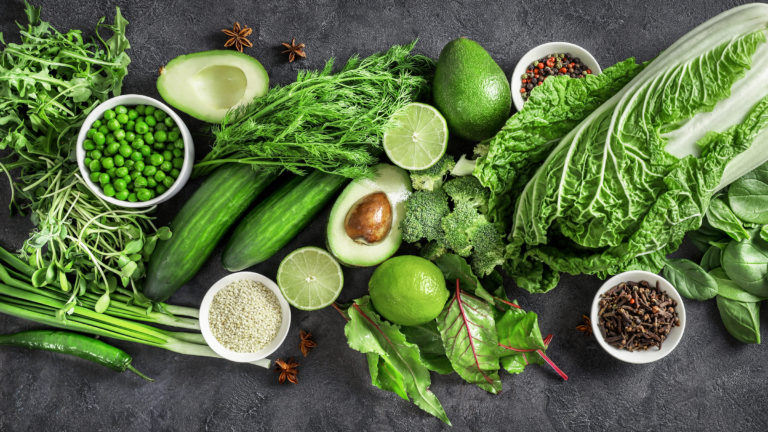 We all know greens do a body good — but they also make for powerful brain food.
We all know greens do a body good — but they also make for powerful brain food.
Leafy greens are a crucial component of the six pillars of nutritional psychiatry.
They are versatile, nutrient-dense, and pack a multitude of brain-healthy plant compounds, including fiber, folate, and vitamins C and K (1), which promote healthy brain aging and mood. Some of my favorite leafy greens include spinach, Swiss chard, collard greens, arugula, romaine, and dandelion greens. For optimal benefit, I encourage you to eat 4-6 cups of these delicious greens per day.
Folate is an important B vitamin that supports neurotransmitter function. Neurotransmitters are chemical messengers in the brain that govern mood and cognition. Where folate deficiency may underlie some neurological conditions, increased intake of folic acid has been shown to have beneficial effects (2) on mental health, brain health, and cognitive age. Additionally, the numerous antioxidant phytonutrients within leafy greens quell inflammation (3) and protect cells from damage caused by reactive oxygen species.
Sufficient dietary folate has been shown to promote lifelong body and brain health. Also known as vitamin B9, folate is integral for cellular development (4) and is especially critical for athletes, in whom cell turnover is more rapid. Pregnant women are given folic acid supplements to prevent neural-tube defects and ensure the healthy development of the baby’s nervous system.
Throughout life, folate deficiency may interfere with DNA synthesis and repair as well as overall cellular function in the brain, contributing to chronic fatigue (5), depression (6), schizophrenia, and bipolar disorders (7). In contrast, optimal folate status is linked with healthier brain aging and delaying the onset of neurodegenerative disorders such as dementia (2).
Leafy greens are also rich in fiber, which promotes (8) microbiome health while reducing inflammation in the gut and brain.
A high-fiber diet also supports mental health by nourishing the gut in a variety of ways. Fiber helps maintain a healthy gut pH (9) while bolstering gut-wall integrity, allowing for better nutrient absorption. And by reducing inflammation, fiber optimizes the health of the microbiota, which produce important neurotransmitters such as serotonin (10), which promotes mental health. Eating a high-fiber diet is actually linked with having fewer symptoms of depression (11)!
With particular regard to athletes, in whom nutrient needs are greater and whose bodies may experience a greater degree of oxidative stress (12), a high-fiber diet helps ensure nutrient absorption while protecting cells from the effects of inflammation.
Hopefully you now have a better understanding of why greens are so crucial to mental and physical health. But they’re also among the most versatile of brain-healthy foods! Here are some of my favorite ways to dish them up:
- Toss fresh, crispy lettuce and cabbage in salads. Top with fresh lemon juice and extra-virgin olive oil for an extra-delicious, brain-healthy treat!
- Bake fresh spinach leaves massaged with avocado oil, salt, and pepper in the oven for crispy roasted spinach “chips” — the perfect dinner side or crunchy snack on its own.
- For an extra “zing,” include spicy arugula atop lettuce wraps and use as extra garnishes on soups or veggie and grain bowls. Just add your choice of clean protein.
- For the kids — and adults, too! — adding a handful of spinach in smoothies adds green goodness without changing the taste.
Including a healthy helping of leafy greens on our plates can have powerful outcomes on our physical and mental health, especially as we age. I hope you feel empowered with the knowledge and resources of nutritional psychiatry to eat for the optimal well-being of your body and brain!
Dr. Uma Naidoo is a Harvard-trained nutritional psychiatrist, professional chef, and nutrition specialist. She is the author of the national bestseller “This Is Your Brain on Food.”
References
- Hossain A, Khatun MA, Islam M et al. Enhancement of antioxidant quality of green leafy vegetables upon different cooking method. Preventive Nutrition and Food Science 22.3(Sept. 2017): 216–222.
- Reynolds, EH. Folic acid, ageing, depression, and dementia. The British Medical Journal 324.7352(June 2002): 1512-1515.
- Scalbert A, Manach C, Morand C et al. Dietary polyphenols and the prevention of diseases. Critical Reviews in Food Science and Nutrition 45.4(2005): 287-306.
- Hwang SY, Sung B and Kim ND. Roles of folate in skeletal muscle cell development and functions. Archives of Pharmacal Research 42(2019): 319-325.
- Werbach M. Nutritional strategies for treating chronic fatigue syndrome. Alternative Medicine Review 5.2(2000): 93-108.
- Sathyanarayana Rao TS, Asha MR, Ramesh BN et al. Understanding nutrition, depression and mental illnesses. Indian Journal of Psychiatry 50.2(2008): 77-82.
- Marx W, Moseley G, Berk M et al. Nutritional psychiatry: the present state of the evidence. Proceedings of the Nutritional Society 76.4(2017): 427-436.
- Makki K, Deehan E, Walter J et al. The impact of dietary fiber on gut microbiota in host health and disease. Cell Host & Microbe 23.6(2018): 705-715.
- Sawicki C, Livingston K, Obin M et al. Dietary fibder and the human gut microbiota: application of evidence mapping methodology. Nutrients 9.2(2017): 125.
- Yano J, Yu K, Donaldson G et al. Indigenous bacteria from the gut microbiota regulate host serotonin biosynthesis. Cell 161.2(2015): 264-276.
- Xu H, Li S, Song X et al. Exploration of the association between dietary fiber intake and depressive symptoms in adults. Nutrition 54(2018): 48-53.
- Watson T, MacDonald-Wicks L and Garg M. Oxidative stress and antioxidants in athletes undertaking regular exercise training. International Journal of Sport Nutrition and Exercise Metabolism 15.2(2005): 131-46.
Leafy Greens: The Ultimate Brain Food